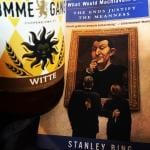This is basically what I said at the conclusion of Lessons and Carols last night. Enjoy!*****************
In between all the usual scramble to keep up with everything at this busiest time of the year, I’ve been trying to keep up with my hobby of reading about various strange cultural trends. My current fascination is the Instagram Influencer. A few years ago, the word “Influencer” was not really a thing. A person could have or gain “influence” in some area by coming up with interesting ideas or becoming an expert or writing a book or something, but now almost anybody can be an “Influencer.” If you are very tall and thin and have the right assortment of carefully placed tattoos and are assiduous in curating your Instagram top 9you might be able to get a deal with some kind of lifestyle company or something, like, a maker of lip-gloss, who gives you free product in exchange for you wearing the gloss and promoting the company so that they make money off your influencing reputation. And then, also, if you don’t have very many followers, you can pay someone to fake like your posts thousands of times so that it looks like you are a lot more awesome than you really are. In this way you become an “influencer” which means that people “follow” you, all while they themselves are trying to become “influencers.” So, one of the cool things you can do is to follow Instagram Influencers online and try to poke holes in their stories. You can troll them or accuse them of privilege or of pretending that things are really easy when clearly they are not. Whole articles are written—daily—about what Instagram influencers are influencing. Don’t judge me, we all have our little vices.
What’s so nice, I think, is to look at the high and exalted of this world, the lavish lifestyles and habits of people who pretend that they have it all, and then go back and look at the occasion of our Lord’s birth. The curious thing about God’s solution to all our little troubles is how shabby it looks on the surface. I mean, we don’t look shabby. We have cleaned it up pretty well this afternoon. Look how scrubbed we are, how gorgeous our music, how sparkling our candles. We have brought our best, this afternoon, and I sure hope somebody will put some of it online.
And the texts we’ve heard today are by no means shabby. On the contrary, they are stately in their cadence, almost impossible to surpass in their restrained beauty. However many times you hear their well-worn, beloved lines they never grow old, or lose their luster. They can, though, roll over and through you, the inner ear missing some of the jarring little details—
the enmity, which is elsewhere called hatred, between her offspring and his offspring,
the not “withholding” of the son, which is a gentle way of saying that Abraham was willing to kill Isaac,
the people “walking” in darkness which doesn’t sound so bad, except that it is a dangerous and terrifying thing to do,
the “stump” of Jesse, which is a tragic picture of the violent cutting down of a big glorious tree so that the sky is left stark, naked, the ground bear and ruined,
the “being troubled” by the visit of an angelic being who, in a few words has the power to overturn the whole course of a life,
the “no place in the inn” at the time when the body kicks into gear and the contractions of labor follow inexorably one upon the other.
In this way God insists that we put our eyes on the kinds of situations we would rather not ever think about let alone face, the ones that the Christmas season is manifestly not about—the inconveniences, the tragedies, the troubles of this life that we are always running away from, are glossing over with a better filter or lens, are pretending aren’t even there.
When I snap a picture of my lovely mocha-latte with the little leaf swirl on top and put a hashtag on it, #blessed or something, I am saying to myself that I have the power to arrange, to craft, to organize my life, to push the sorrow and sickness and trouble to the outer margins so that they aren’t even there.
Whereas, the way that Jesus comes into the world says a great deal—everything in fact—about the reality of my estate. He comes to us “where we are,” which is something we pretend to want to be able to do for each other. Meet me where I am, I might say, but I don’t really mean it. I want you to meet me where I imagine myself to be, on top of a mountain, in a beautiful house, strolling along by the sea decorated by a luminous sunset that glints off my great haircut.
It is humiliating for God to meet us where we are—in a dark out of the way town with no electricity, no running water, isolated from the kinds of relationships we know we all need to “flourish,” in the dark, really. The Incarnation is the Anti-Influence. It cuts through the pretense, the lie that life—that we—are really ok. It is we who are shabby, pathetic, lying about who we are and how beautiful we have made our lives.
In other words, God didn’t give John the beautiful prologue to his whole gospel, that grand, stately poetry about joining himself to us as a reflection of something in us. Rather, he illustrated those gorgeous lines with the inconvenience, humility, and suffering of an actual birth, of his own precarious and ruinous journey to our shabby and unflattering humanity. He endured the close narrow world of the womb. He had his mother and father go on trips they could barely afford—both in time, money, and certainly not in hassle and mental health. He rousted them in the middle of the night to flee from the brutality of Herod. He made them to be strangers in a strange land, even when they went home to their familial community who no longer had any real use for them.
Who am I? That’s the question of the age. If I can craft an answer to that question—and often it doesn’t even really matter what the answer is—and let the world know, I will not have lived in vain. In searching for the answer and sharing it I traverse farther and farther into the darkness, the place where no lens or filter has any power. But God, who sees everything, by his very incarnation, his descent into the darkness itself, pokes a hole so large through my story that the light floods in, showing me the true state of myself. And, in the light, what do I see? What do my eyes really behold? They are lifted from myself and all my troubles and there rest on the most fantastical sight in the cosmos—a baby, who grows into a man, a strong man who does what none of us even want, he faces our greatest enemy, sin and death, crushing under his heel the offspring of Satan, stepping into the place of Isaac, springing up from the stump, a righteous, green, glorious shoot with branches strong enough to shelter every thirsty and exhausted traveler, the innermost comfort for the troubled and anxious mind, the “place” the “room” into whom all may come to find light and hope. Which, no matter which way you look at it, is the most beautiful thing in the world.













